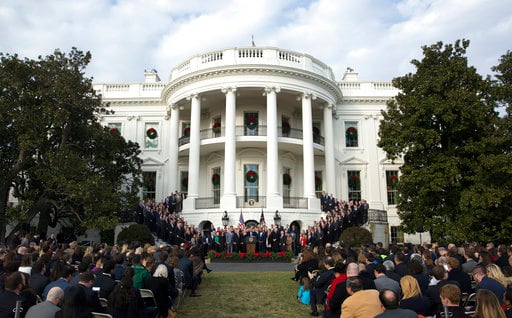WASHINGTON — Lawmakers are hoping to attach a year’s worth of Veterans Affairs reform measures to the omnibus federal budget bill due early this week, in the hopes of adding another round of wins on veterans policies to the must-pass spending legislation.
Included in the bipartisan proposal are well-debated plans for overhauling VA’s community care programs — provisions that would allow more veterans to receive free medical treatments from private-sector doctors — as well as a review of the department’s national footprint and massive changes to the VA caregiver benefit program.
If the measure is passed into law, it will represent another big legislative win for veterans advocates who have seen steady activity on their issues over the last 14 months.
Sources involved in the negotiations say that key Republicans and Democrats in the Senate have signed off on the plan, but that House Democrats have voiced concerns about moving ahead quickly with the sweeping measures.
The omnibus budget measure is set to be released late Monday night or early Tuesday morning. Lawmakers have until Friday night to pass the full-year budget bill or trigger a partial government shutdown.
The must-pass nature of the omnibus has made it a target for a host of unrelated congressional priorities. If the veterans issues can be attached to the legislation, it creates an easier path to enacting a long-list of sought after changes at the department.
RELATED

Conversely, if the veterans measures aren’t included in the final draft, it could create significant hardship for supporters. With an election looming in November and Congress still politically fractured, major legislative packages like the three-part veterans measure are expected to be difficult to pass in coming months.
House Veterans’ Affairs Committee Phil Roe, R-Tenn., supports the deal, according to spokeswoman Tiffany Haverly. She said negotiations are ongoing.
In a letter released late Monday afternoon, officials from eight of the largest veterans advocacy groups — American Legion, AMVETS, Disabled American Veterans, Veterans of Foreign Wars, Paralyzed Veterans of America, Military Officers Association of America, Vietnam Veterans of America and Wounded Warrior Project — called the omnibus amendment a reasonable compromise on a host of contentious issues.
“Over the past year, we have been involved in numerous discussions, round tables and hearings regarding all three major elements of the proposed veterans legislation,” the letter states. “”We believe that the final compromise language under consideration will measurably improve the lives of millions of veterans today and in the future.”
The most pressing of the three veterans priorities is the community care overhaul, which has been a top legislative priority for President Donald Trump since he came into office. On the campaign trail, he promised a broader use of federal funds to care for veterans, to include more appointments with community doctors outside the VA system.
A new, consolidated community care system would include more free visits at private-sector physicians’ offices paid for with taxpayer funds, provided that they have used VA health care in the last two years. Other veterans could more easily seek outside care for specialty services or if they face access issues at VA medical centers.
Louis Celli, director of the American Legion’s Veterans Affairs and Rehabilitation program, said the compromise language includes language allowing the outside care “upon the authorization of such care or services by the [VA] secretary,” which he said assuages concerns that the expansion could amount to privatizing VA responsibilities for veterans care.
The asset review mirrors a military base closure round but for VA facilities. VA Secretary David Shulkin has lobbied Congress for a review of the department’s national footprint, saying VA has hundreds of aging or outdated facilities that should be consolidated.
The caregiver expansion has been a priority of the veterans groups and Democrats in Congress, as well as Senate Veterans’ Affairs Committee Chairman Johnny Isakson, R-Ga.
Currently only caregivers of veterans from the post-9/11 era are eligible for monthly stipends through the department. The new proposal would expand that to veterans of all eras, first starting with pre-1975 veterans and later phasing in the remaining group.
No cost estimates have been released for the plan, but similar legislation under consideration in Isakson’s committee is estimated to cost roughly $54 billion over five years by the Congressional Budget Office — which could prove problematic as the proposal winds through Congress.
Veterans groups said the negotiations on the legislative package accelerated this weekend, but noted in the letter that the work “is based on months and months of consultation with our organizations and many other stakeholders.”
“While not perfect, we believe that this legislation represents a fair compromise that will help to strengthen veterans health care for future generations, while ensuring that caregivers of veterans of all generations get the support they deserve,” they said.
Whether it makes it into the final omnibus plan remains unclear, as is the timeline for the omnibus release. Officials had originally planned to unveil the final language on Sunday night, but have shifted that release back multiple times as negotiations on provisions continue.
Leo covers Congress, Veterans Affairs and the White House for Military Times. He has covered Washington, D.C. since 2004, focusing on military personnel and veterans policies. His work has earned numerous honors, including a 2009 Polk award, a 2010 National Headliner Award, the IAVA Leadership in Journalism award and the VFW News Media award.





